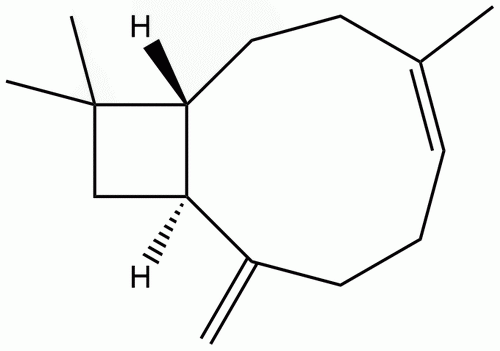Product name: β-Caryophyllene
Synonym name: trans-Caryophyllene
Catalogue No.: BPF0502
Cas No.: 87-44-5
Formula: C15H24
Mol Weight: 204.357
Botanical Source:
Physical Description: Oil
Type of Compound: Sesquiterpenoids
Purity: 95%~99%
Analysis Method: HPLC-DAD or/and HPLC-ELSD
Identification Method: Mass, NMR
Packing: Brown vial or HDPE plastic bottle
Storage: Store in a well closed container, protected from air and light. Put into refrigerate or freeze for long term storage.
Whenever possible, you should prepare and use solutions on the same day. However, if you need to make up stock solutions in advance, we recommend that you store the solution as aliquots in tightly sealed vials at -20℃. Generally, these will be useable for up to two weeks.
The product could be supplied from milligrams to grams, up to kilograms
Inquire for bulk scale.
Descriptions:
Trans-caryophyllene (TC), a component of essential oil found in many flowering plants, has shown its neuroprotective effects in various neurological disorders, TC has effect on kainic acid-induced seizure activity caused by oxidative stress and pro-inflammation, and significantly inhibits KA-induced generation of malondialdehyde, TC exert cerebral anti-inflammatory effects by mitigating the expression of proinflammatory cytokines, such as TNF-α and IL-1β; suggest that TC has a potential protective effect on chemical induced seizure and brain damage.[1]
Trans-caryophyllene and alpha-humulene from Salvia officinalis has cytotoxic activity in animal and human tumor cells.[2]
Trans-caryophyllene has anti-spasmodic activity on rat tracheal smooth muscle which could be explained, at least in part, by the voltage-dependent Ca2? channels blockade.[3]
Trans-caryophyllene can reduce both acute and chronic pain in mice, which may be mediated through the opioid and endocannabinoid systems.[4]
Trans-caryophyllene possesses anti-inflammatory and analgesic properties, has the prevention of leukopenia in an experimental chemotherapy model in Wistar rats, exerts anti-inflammatory effects in TNF-α-stimulated chondrocyte models.[5,6]
References:
[1] Liu H, Song Z, Liao D, et al. Neurochem Res, 2015, 40(1):118-23.
[2] Hadri A E, Rio M A G D, Sanz J, et al. An Real Acad F, 2010, 76(3):343-56.
[3] Pinho-Da-Silva L, Mendes-Maia P V, Teófilo T M, et al. Molecules, 2012, 17(10):11965-77.
[4] Paula-Freire L I G, Andersen M L, Gama V S, et al. Phytomed Int J Phytother Phytopharmacol, 2013, 21(3):356-62.
[5] Campos M I, Campos C N, Aarestrup F M. Mol Clin Oncol, 2015, 3(4):825-8.
[6] Campos M I C, Vieira W D A, Aarestrup F M, et al. Int J Mol Med, 2014, 34:S31.
[7] Patra K C, Singh B, Pareta S, et al. NatProd Res, 2010, 24(20):1933-8.


